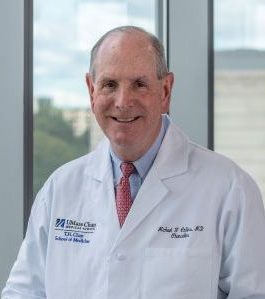Impactful Leaders Podcast | Strategies for Uncertain Times in Academic Medicine: UMass Chan’s Michael F. Collins, M.D.
- Home
- Insights
- Impactful Leaders Podcast | Strategies for Uncertain Times in Academic Medicine: UMass Chan’s Michael F. Collins, M.D.
 Michael F. Collins, M.D., has always been a doer, but that doesn’t mean he was always a leader. Leading, he observes, requires relinquishing a “command and control” mindset, letting others be the doers, and being willing to embrace the uncertainty which is ubiquitous in academic medicine today. It takes time to learn.
Michael F. Collins, M.D., has always been a doer, but that doesn’t mean he was always a leader. Leading, he observes, requires relinquishing a “command and control” mindset, letting others be the doers, and being willing to embrace the uncertainty which is ubiquitous in academic medicine today. It takes time to learn.
For nearly two decades, Dr. Collins has led UMass Chan Medical School through extraordinary growth and transformation, overseeing a billion-dollar enterprise and championing life sciences strategy across five campuses. As the longest-serving chancellor in the University of Massachusetts system, Dr. Collins reflects on what it takes to lead in an era defined by complexity and volatility. “We had much more certain times 20 years ago,” he recalls. “Managing now is very much a balance beam act” of assessing uncertainty and collaborating with others to work through challenges.
In this Impactful Leaders Podcast episode, Dr. Collins speaks with Kimberly Smith, Executive Partner of WittKieffer’s Academic Medicine Practice, and Andrew Bean, Principal, sharing candid insights on navigating financial pressures, research funding challenges, and workforce demands while maintaining institutional stability. He emphasizes the importance of transparency and adaptability, recalling lessons learned during the pandemic: “I got more people to follow me when I said I didn’t know than when I gave a directive to say, ‘Do this or do that.’ ”
Their conversation also explores strategies for sustaining innovation and morale amid shrinking federal research dollars. Collins outlines how UMass Chan is leveraging partnerships, private foundations, and state support to stabilize its research enterprise and retain top talent. His approach offers a roadmap for leaders seeking to balance short-term survival with long-term ambition in highly competitive environments. It’s imperative that organizations find funding lest they lose a generation of research that will take longer than a generation to replace.
Finally, Dr. Collins reflects on the enduring value of mentorship and the mindset required for impactful leadership. His advice is simple yet profound: “First, you have to want to, then you can.” This episode delivers actionable insights on resilience, resourcefulness, and leading with purpose in an era of unprecedented change.








